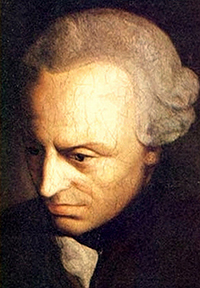When the tremulous radiance of a summer night fills with twinkling stars and the moon itself is full, I am slowly drawn into a state of enhanced sensitivity made of friendship and disdain for the world and eternity.
immanuel Kantquotes
1724 - 1804
 The great German-Philosopher, Immanuel Kant (1724-1804) initiated a revolution in philosophical thought with his famous work, Critique of Pure Reason. Arguably one of the greatest philosophers of all time, Kant not only influenced the thinkers of the Enlightenment, but all subsequent philosophies in Western thought as well.
The great German-Philosopher, Immanuel Kant (1724-1804) initiated a revolution in philosophical thought with his famous work, Critique of Pure Reason. Arguably one of the greatest philosophers of all time, Kant not only influenced the thinkers of the Enlightenment, but all subsequent philosophies in Western thought as well.
Kant earned his doctorate in Philosophy from the University of Konigsberg. He was denied professorship there again and again, but refused to accept prestigious teaching offers elsewhere because he was content with his simple life in the small city. He worked as a lecturer and tutor for 15 years until he became a full professor and spent the rest of his career teaching metaphysics and logic.
Other notable works include his Critique of Practical Reason and his Critique of Judgment.
While Kant published hundreds of papers and critiques over his lifetime, his strongest contribution to philosophy was his focus on ethics and the study of moral actions. He synthesized two opposing theories, rationalism and empiricism, and found a middle ground of thought between them.
He argued for a radical idea that, as individuals, our minds organize our experiences to make sense of how the world works. He believed that reason could not prove or disprove theories of God, freedom or immortality since those ideas exist beyond the scope of human experience. But he held they were good and rational beliefs since they contributed to an orderly and moral society.
Committed to his work, Kant never married, and despite an embittering loss of memory, he continued to write until his dying day.
Lithuanian nation must be saved, as it is the key to all the riddles – not only philology, but also in history – to solve the puzzle.
We can never, even by the strictest examination, get completely behind the secret springs of action.
But, though all our knowledge begins with experience, it by no means follows that all arises out of experience.
Even if, by some especially unfortunate fate or by the niggardly provision of stepmotherly nature, [the good will] should be wholly lacking in the power to accomplish its purpose; if with the greatest effort it should yet achieve nothing, and only the good will should remain (not, to be sure, as a mere wish but as the summoning of all the means in our power), yet would it, like a jewel, still shine by its own light as something which has its full value in itself.
accomplish / effort / fate / value
For if we regard space and time as properties that must, as regards their possibility, be found in things in themselves, […] then we really cannot blame the good Bishop Berkeley for degrading bodies to mere illusion. Nay, even our own existence, which would thus be made dependent on the self-subsistent reality of a non-entity such as time, would, along with this time, be changed into mere illusion – an absurdity of which hitherto no one has been guilty.
What does it avail, one will say, that this man has so much talent, that he is so active therewith, and that he exerts thereby a useful influence over the community, thus having a great worth both in relation to his own happy condition and to the benefit of others, if he does not possess a good will?
True politics cannot take a single step without first paying homage to morals, and while politics itself is a difficult art, its combination with morals is no art at all; for morals cuts the Gordian knot which politics cannot solve as soon as the two are in conflict.
The whole interest of my reason, whether speculative or practical, is concentrated in the three following questions: What can I know? What should I do? What may I hope?
Man desires concord; but nature know better what is good for his species; she desires discord.